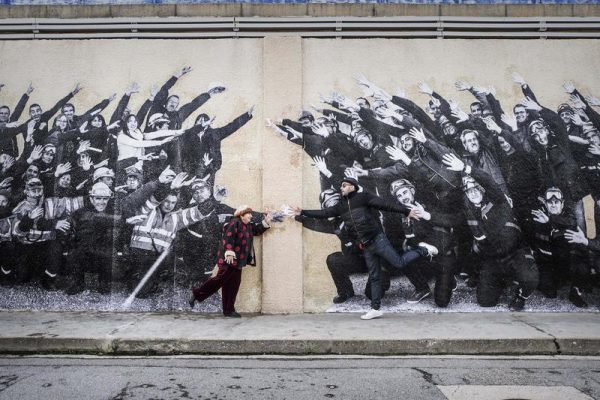Faces Places: New Adventures, by Scott Nye
On Monday, grieving from the news in Las Vegas and the sheer hopelessness of genuinely trying to prevent another such tragedy from happening here, I went to see Agnès Varda’s new film, Faces Places. And for just under 90 minutes and a bit of the afterglow following, I felt very happy for the world and the many good people in it.
It’s simple enough – Varda and photographer/artist JR travel to small French towns, take pictures of the locals, and plaster them on the sides of buildings they call work, or home. Faces, places. They talk to the people about their lives, about their impressions of the photos (or the act of being photographed), and then they’re on the road again to the next town. They get to know each other. Varda is in her late eighties, a legend who arguably directed the first truly New Wave film (1955’s La Pointe Courte) and continues to work when she can and tour when she can’t. JR is in his mid-thirties, has never revealed his true name, and rose up in the street art movement in the early 2000s.
They share that dedication to work, but little else. Their concerns – and to some extent, success – are quite different, and Varda teases him about his unwillingness to remove his trademark sunglasses or hat, an extension of his artistic impulse to look outward, not inward. Those familiar with Varda’s films will know them to be inward-looking films, incorporating autobiographical elements while deeply curious about the present world. Neither she nor JR are terribly inhibited, happy to ask potentially-confrontational questions about the degree to which people feel sidelined in their lives, or photograph and plaster the images of people who would rather not be shot at all. Her age gives her an edge with middle-aged and older people; his relentless energy ensures they take full advantage of every space they can.
A team of a half-dozen cinematographers ensure they always have the space to use. There’s a notable shift in the styles between semi-narrative segments – showing preplanned dialogue between JR and Varda – and spontaneous street encounters, the former bearing some of the hallmarks of Varda’s other work. Her proclivity for semi-wife frames and bright colors brings out the life in even the most industrial areas, and a brief animated opening gives the film license to appear almost cartoonish at times. The issue of subtitles aside, this spirit opens up the possibility of a family film experience, one that might give the right kids a taste of another culture and a curiosity about the world in general.
Though her work never lacked spontaneity, Varda – like most of her contemporaries (though few still survive) – has become more childlike with age, not simply more certain of each decision, but certain that fussing about over them won’t necessarily produce anything better than one’s immediate inspiration. This is partially, perhaps, born from growing nearer to death, as she talks about in her 2000 film The Gleaners and I, and Faces Places reflects especially towards the end on the winnowing opportunities one has at such a point.
Varda, as a character in the film, and undoubtedly personally as well, comes face to face with the realization that she won’t have the time to see again all those she loved. She and Jean-Luc Godard are the only remaining filmmakers from the New Wave, in fact. Everyone else has passed, at a count considerably higher since her last film, The Beaches of Agnes. She can still visit places she’s never been, meet new people, and embark on new projects, but she’s a supporting player to almost everyone she comes into contact with (most especially JR, though he doesn’t treat her that way), and the relative ability to fill significant voids is almost null. But Faces Places illustrates that her capacity for reflexion, expression, and vulnerability in her art has not diminished at all. There’s too much goodness left in the world.































“semi-wife frames”? I think you meant “wide”.